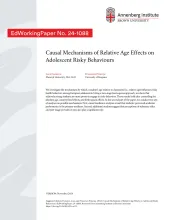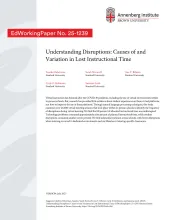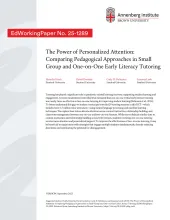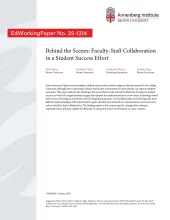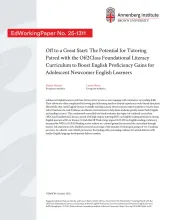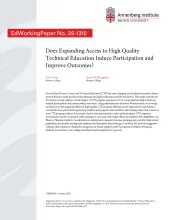Follow the User Guide to start building your site.
Follow the User Guide to start building your site.
NEW EdWorkingPapers
Causal Mechanisms of Relative Age Effects on Adolescent Risky Behaviours
Age differences between classmates are attracting growing attention in academic research and public policy, yet their underlying mechanisms remain understudied. We examine how relative age affects adolescents’ risky behaviors across Europe. Using Health Behaviour in School-Aged Children (HBSC) survey data and a two-stage least squares (2SLS) strategy, we provide causal estimates that isolate… more →
Understanding Disruptions: Causes of and Variation in Lost Instructional Time
Virtual instruction has boomed after the COVID-19 pandemic, including the use of virtual environments within in-person schools. But, research has provided little evidence about student experiences on these virtual platforms, nor how to improve the use of these platforms. Through natural language processing techniques, this study examines over 26,000 virtual tutoring sessions that took place… more →
The Power of Personalized Attention: Comparing Pedagogical Approaches in Small Group and One-on-One Early Literacy Tutoring
Tutoring has played a significant role in pandemic-related learning recovery, supporting student learning and engagement. A recent randomized controlled trial estimated that one-on-one virtual early literacy tutoring was nearly twice as effective as two-on-one tutoring for improving student learning (Robinson et al., 2024). To better understand this gap, we analyze transcripts from 16,629… more →
Behind the Scenes: Faculty-Staff Collaboration in a Student Success Effort
Interventions to improve postsecondary student success often involve supports that are external to the college classroom, although there is growing evidence that faculty involvement in interventions can improve student outcomes. This paper explores the challenges that arise when faculty and staff collaborate to improve student success as well as the organizational changes that support the… more →
Off to a Great Start: The Potential for Tutoring Paired with the Off2Class Foundational Literacy Curriculum to Boost English Proficiency Gains for Adolescent Newcomer English Learners
Adolescent English learners with low literacy strive to learn a new language with minimal or no reading skills. Their efforts are often complicated by having special learning needs or limited experiences with formal education. Meanwhile, they need English literacy in middle and high school, where teachers expect students to read to learn rather than learn to read. Evidence on effective… more →
Does Expanding Access to High Quality Technical Education Induce Participation and Improve Outcomes?
Over the last 15 years, Career and Technical Education (CTE) has been changing as schools have aimed to better meet workforce needs and diversify pathways into higher education and the workforce. This study provides the first known causal evidence on the impact of CTE program expansion in U.S. comprehensive high schools on student participation and postsecondary outcomes.
Policy and Practice Series
Webinar Series
The Bigger Picture: Key Trends in America’s Changing Education Landscape
When: Thursday, November 13 at 3:00pm ET
Where: Zoom (click here to register)
Join us for our next EdWorkingPapers Webinar, where we’ll bring timely, policy-relevant research to life through live conversation. Our fall session on Thursday, November 13 at 3:00pm ET will focus on long-term trends in student enrollment and achievement. Hear directly from the authors as they share insights and discuss implications for research and policy, and come with your questions!

James H. Wyckoff, presenting Puzzling Over Declining Academic Achievement

Abigail Francis, presenting School Enrollment Shifts Five Years After the Pandemic

Joshua Goodman, presenting School Enrollment Shifts Five Years After the Pandemic

Susanna Loeb, (EdWorkingPapers Review Board member) facilitating the conversation and Q&A
